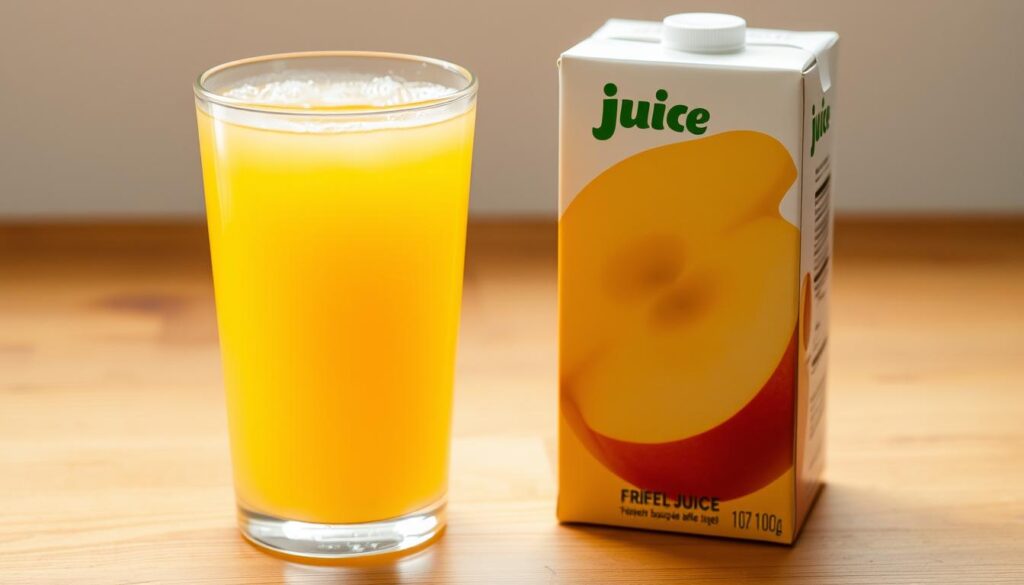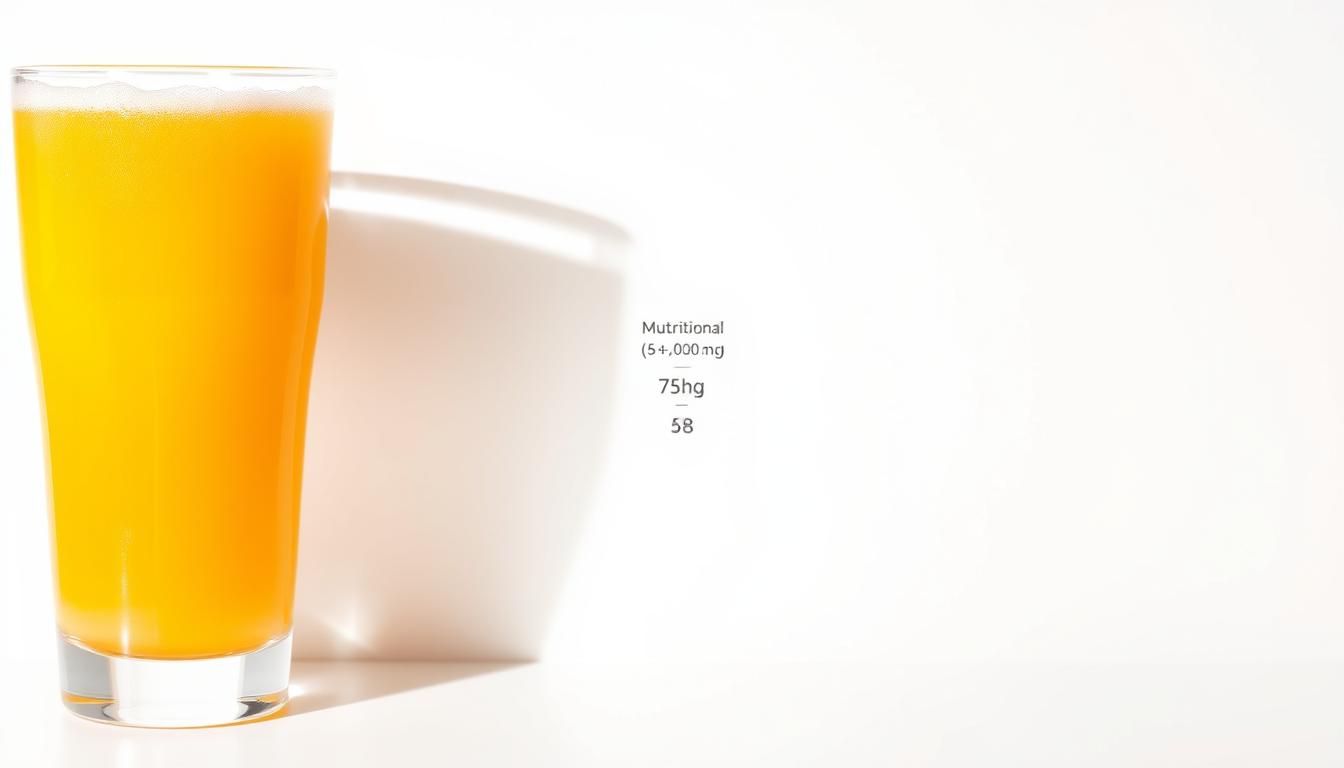Table of Contents
Every morning, I’d grab a glass of apple juice without thinking. It tasted refreshing and sweet, making it seem like a healthy pick. But, as I dug into its nutritional facts, I found out there’s more than its taste.
Apple juice has been a favorite in American homes for years. It’s often given to kids at breakfast or enjoyed as a quick drink. Yet, knowing the real health effects of this juice requires looking beyond its taste.
This article will take you on a detailed journey through this juice. We’ll look at its nutritional content, health benefits, and risks. Plus, we’ll offer tips on choosing the right apple juice for you.
Key Takeaways
- It offers both nutritional benefits and possible health concerns
- Not all apple juice products are the same
- It’s important to drink this juice in moderation
- Fresh and organic options might be healthier
- Reading ingredient labels is key to making smart choices
Understanding the Nutritional Profile
Apple juice is a popular choice for a healthy drink. It’s full of nutrients that can improve your health. Knowing what’s in helps you decide if it’s right for you.
Apple juice has a mix of vitamins, minerals, and sugars. These elements make it a good option among fruit juices.
Essential Vitamins and Minerals
Apple juice gives you important nutrients:
- Vitamin C: Boosts immune system and promotes skin health
- Potassium: Supports heart and muscle function
- Antioxidants: Helps protect cells from damage
Natural Sugar Content
Apple juice has natural sugars. A typical serving has about 24 grams of sugar. Choosing 100% pure apple juice means no added sugars.
Caloric Value per Serving
An 8-ounce serving of apple juice has 110-120 calories. It’s a drink with moderate calories, good for a balanced diet.
Enjoy apple juice as part of a varied diet. It’s good for you, but don’t overdo it.
Health Benefits of Drinking this Juice
Apple juice is more than a tasty drink. It’s full of nutrients that boost your health. It’s a top pick for a healthy drink, thanks to its many benefits.
The antioxidants in this juice protect your body from harm. These compounds fight off free radicals and boost your immune system. Polyphenols, found in it, offer health perks.
- Supports heart health by potentially lowering cholesterol
- Provides essential vitamins and minerals
- Helps maintain hydration
- Boosts overall immune function
this juice adds to your daily nutrient intake. Here’s what you get in an 8 oz serving:
| Nutrient | Amount per 8 oz Serving |
|---|---|
| Vitamin C | 100% Daily Value |
| Potassium | 7% Daily Value |
| Antioxidants | High concentration |
While it is great, eating whole apples is better. Whole fruits give you more fiber. But, apple juice is a tasty, healthy choice for your wellness.
Potential Risks and Side Effects
It is a favorite drink for many, but it’s important to know its health risks. Every drink has good and bad sides, and apple juice is no different.
Sugar Content Concerns
this juice can sneak up on you with its sugar content. A single serving might have a lot of natural and added sugars. This could affect your health. Nutritionists say to watch out for these sugar-related risks:
- Potential blood sugar spikes
- Weight management challenges
- Increased risk of metabolic issues
Impact on Dental Health
The acidity in apple juice can harm your teeth. Drinking it too often might cause dental problems like:
- Tooth decay
- Enamel erosion
- Increased cavity risk
Pesticide Exposure Risks
Non-organic apple juice might have pesticide residues. To reduce exposure, try these tips:
| Juice Type | Pesticide Risk | Recommended Action |
|---|---|---|
| Conventional | High | Choose organic options |
| Organic | Low | Preferred choice |
Knowing these risks doesn’t mean you should avoid it. Moderation and informed choices help you enjoy it safely.
Apple Juice vs Other Fruit Juices: A Comparison
Apple juice is a favorite among many. Each fruit juice has its own health benefits. Choosing the right one is key for those who care about their health.
Let’s compare it with other popular fruit juices:
- Orange Juice: It’s full of vitamin C. Orange juice has more nutrients than apple juice. It also has more antioxidants to boost your immune system.
- Grape Juice: Grape juice is great for your heart. It has lots of polyphenols. Apple juice has fewer antioxidants.
- Cranberry Juice: Cranberry juice is good for your urinary tract. It tastes tart, unlike the sweeter apple juice.
Looking at the nutritional values gives us some interesting facts:
| Juice Type | Calories (8 oz) | Sugar Content | Key Nutrients |
|---|---|---|---|
| Apple | 120 | 28g | Vitamin C, Potassium |
| Orange | 110 | 22g | Vitamin C, Folate |
| Grape | 140 | 36g | Resveratrol, Antioxidants |
When picking fruit juices, think about your health goals. Apple juice is a tasty choice. It offers a mix of sweetness and some health benefits among fruit juices.
Fresh vs Store-Bought Juice: What’s Better?

Deciding between fresh and store-bought juice can be tough. Each has its own benefits and downsides. These affect the juice’s nutritional value and quality.
Processing Methods that Affect Juice Quality
How apple juice is made changes its nutritional content. Fresh juice keeps more nutrients because it’s processed less. Store-bought juice goes through several steps:
- Pasteurization to extend shelf life
- Concentrated processing
- Heat treatment
- Potential additive inclusion
Nutrient Retention Comparison
Fresh juice has more natural vitamins and enzymes than commercial juice. The processing of store-bought juice can lower important nutrients.
| Nutrient Characteristic | Fresh Juice | Store-Bought Juice |
|---|---|---|
| Vitamin C Retention | High (90-100%) | Moderate (50-70%) |
| Enzyme Preservation | Excellent | Limited |
| Antioxidant Levels | Maximum | Reduced |
Storage Guidelines for Optimal Freshness
Keeping your apple juice fresh and safe is key. Fresh juice needs to be refrigerated quickly. Store-bought juice can last longer.
- Fresh juice: Consume within 24-48 hours
- Refrigerate immediately after preparation
- Store-bought juice: Check expiration dates
- Seal containers tightly
Knowing these differences helps you choose wisely. You can balance convenience with nutrition in your juice choices.
How Much Apple Juice Should You Drink Daily?
Knowing how much apple juice to drink daily is important for a balanced diet. it can be a healthy choice, but only in moderation. Experts say to keep your intake low for a balanced diet.
For adults, the rules for this juice are simple:
- Drink no more than 4-8 ounces (120-240 ml) a day.
- Mix juice with water to cut down on sugar.
- Go for 100% apple juice without added sugars.
Children need even more careful watching when it comes to apple juice. Pediatric nutritionists advise:
- Toddlers (1-3 years): Stick to 4 ounces a day.
- Preschoolers (4-5 years): They can have up to 6 ounces.
- School-age kids: Limit it to 8 ounces.
Pro tip: Whole fruits are better than juice. A whole apple gives more fiber and less sugar than juice.
Your health, how active you are, and your diet should help decide how much juice you drink. If you have diabetes or are trying to lose weight, be extra careful. Talk to a doctor about adding apple juice to your diet.
Choosing the Best Juice Products
Finding the right apple juice can be tough with so many choices. Knowing what makes a juice high-quality is key for your health and taste.
When looking for juice, keep these points in mind to get the best:
Organic Options Matter
Organic juice has big benefits over regular juice. Look for labels that show it’s free from bad stuff and additives.
- Seek USDA Organic certified labels
- Check for 100% pure juice without added sugars
- Prioritize cold-pressed or minimally processed options
Decoding Product Labels
It’s important to understand what’s on the label when picking juice. Look for these key things:
- Ingredient list transparency
- Nutritional information
- Source of apples
- Processing methods
Quality Indicators to Consider
Not all juices are the same. Check these quality signs to choose wisely:
- Color: Rich, clear amber means it’s good quality
- Packaging: Dark glass or opaque keeps nutrients safe
- No artificial preservatives
- Minimal processing
By picking your apple juice carefully, you’ll get a tasty and healthy drink that helps your health goals.
Juice for Different Age Groups
this juice is good for different ages because it has special nutrients. Knowing how it fits into our diets helps us choose better drinks.
For babies and young kids, doctors say to limit apple juice. The American Academy of Pediatrics advises:
- No juice for children under 12 months
- Limited servings for toddlers (4-6 ounces daily)
- Diluting juice with water to reduce sugar intake
Kids in school can have apple juice as part of a healthy diet. Moderation is key to avoid too much sugar. The right amount depends on their age and diet.
Adults can get vitamins and stay hydrated with apple juice. Seniors might like it for its antioxidants and easy digestion.
When picking apple juice, think about:
- Choosing 100% pure juice options
- Checking sugar content
- Selecting organic varieties when possible
Every age needs a special way to enjoy apple juice. Talking to doctors can help you drink it for the best health.
Conclusion
Apple juice can be a tasty and healthy drink if you drink it wisely. Knowing what’s in it helps you choose better. It has good points but drinking it too much can be a problem.
Think about your health goals and what you need to eat. Some people like it for its vitamins, while others watch the sugar. Try eating whole fruits too to get different nutrients. Choosing organic can make your drink even better.
Drink apple juice in small amounts. Go for fresh or lightly processed to keep it nutritious. Always check the label for added sugars or preservatives. Making good choices about what you drink is important for your health.
It’s good to have different drinks in your diet. Apple juice can add to your healthy eating plan, but don’t forget whole fruits and water. Knowing its good and bad points helps you enjoy it in a healthy way.

